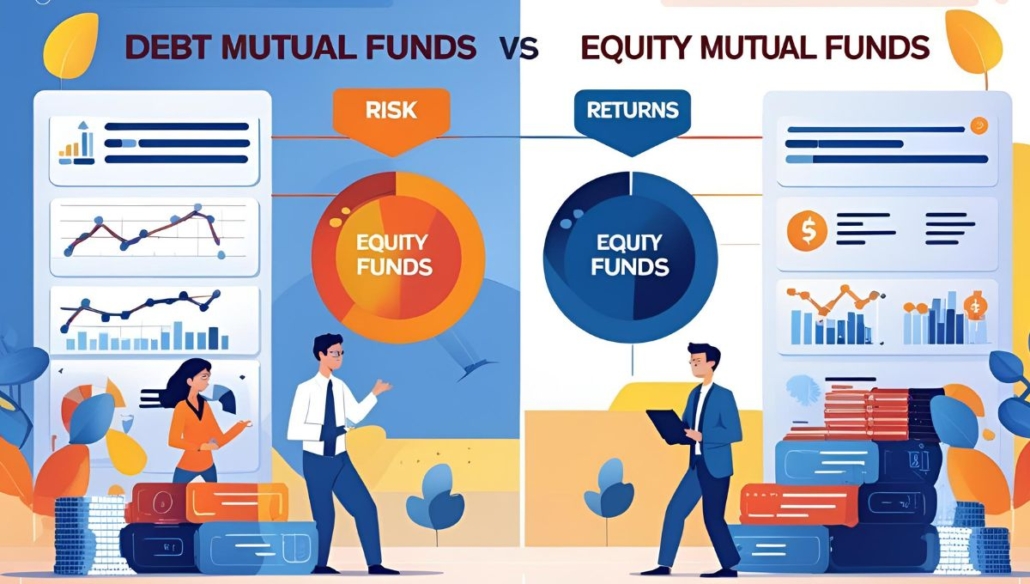Debt Mutual Funds vs Equity Mutual Funds
Choosing between debt and equity mutual funds in 2025 is no longer just about picking the safer or the more rewarding option—it’s about aligning your financial goals with evolving market dynamics. With changes in interest rates, inflation, and stock market trends, investors must assess which type of mutual fund best suits their investment profile.
Let’s break down both types of funds and help you make a smarter investment decision this year.
What are Debt Mutual Funds?
Debt mutual funds invest in fixed-income securities, including government securities, corporate bonds, commercial papers, and treasury bills. These funds are relatively low-risk and aim to provide stable and predictable returns.
Key Features:
-
Ideal for short to medium-term investments.
-
Suitable for conservative investors.
-
Less influenced by market volatility but may be affected by interest rate movements, especially in long-duration funds.
-
Offers high liquidity, allowing easy redemption after a short holding period.
What are Equity Mutual Funds?
Equity mutual funds invest primarily in stocks and equity-related instruments. These funds aim to generate high returns by participating in the growth of publicly listed companies.
Key Features:
-
Designed for long-term investment horizons (5+ years).
-
Best suited for aggressive investors with a high-risk appetite.
-
Returns are tied to stock market performance, making them more volatile.
-
Offers potentially higher growth over the long run.
Key Differences Between Equity and Debt Mutual Funds
| Feature | Equity Mutual Funds | Debt Mutual Funds |
|---|---|---|
| Investment Type | Stocks and equity-linked securities | Bonds, T-bills, and fixed-income instruments |
| Risk Level | High (market-dependent) | Low to moderate (interest rate & credit risk) |
| Return Potential | High but volatile | Moderate and stable |
| Investment Horizon | Long-term (5+ years) | Short to medium-term (1–5 years) |
| Ideal For | Growth-seeking aggressive investors | Stability-seeking conservative investors |
| Taxation | LTCG >1 year taxed @10% over ₹1 lakh | LTCG >3 years taxed @20% with indexation |
| Liquidity | High, but impacted by the market | High, with stable valuation |
| Volatility | High (stock market dependent) | Low (sensitive to interest rate changes) |
Debt or Equity Mutual Funds: Which is Better for You in 2025?
The choice depends on several personal and economic factors:
-
If you’re aiming for steady income and capital preservation, debt funds might be your best bet in the current interest rate environment.
-
If you’re targeting wealth creation over the long term and can withstand short-term market volatility, equity mutual funds could be more rewarding.
Also, consider your time horizon and tax strategy. For instance, gains from equity mutual funds held over a year are taxed at a lower rate compared to short-term gains, while debt fund taxation depends on whether the holding period is less than or more than three years.
Conclusion: A Balanced Approach Works Best in 2025
In 2025, the ideal mutual fund choice isn’t strictly equity or debt—it’s a thoughtful combination of both, tailored to your individual goals, financial needs, and the evolving market landscape. Equity mutual funds continue to present strong growth opportunities amid ongoing economic recovery, technological advancements, expanding business sectors, and favorable market reforms. On the other hand, debt mutual funds offer capital protection, steady income, lower volatility, and resilience during uncertain market conditions or high-interest-rate phases.
A well-diversified portfolio helps mitigate risk while optimizing potential returns. By carefully evaluating your risk tolerance, investment horizon, and expected returns, you can construct a personalized and resilient investment plan. Consider allocating funds across asset classes, including hybrid mutual funds, which blend the benefits of both equity and debt instruments. This balanced, goal-oriented strategy not only offers flexibility but also ensures you’re well-positioned to navigate market fluctuations, capitalize on growth opportunities, and achieve long-term financial stability and wealth creation in 2025 and beyond.
![]()




Pingback: Should You Invest in Balanced Advantage Funds? Benefits, Risks, and Suitability - Cash Babu
Pingback: Benefit of Multi Asset Allocation Fund over FlexiCap Fund: Which is Better for Long-Term Investment in 2025? - Cash Babu